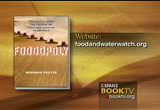tv Book TV CSPAN January 19, 2013 7:00pm-8:00pm EST
7:00 pm
dream. martin stream. the legacy of martin luther king jr. of the booktv.org for more on this weekend's television schedule. the director of food and water watch argues that our businesses such as kraft and tyson have hurt farmers and marginalize the help of crops and limited can affect agriculture industries hold. next on booktv. >> thank you so much for coming this evening. i am very excited to be here. i just got off the book to her this week. i have thinking about writing a book for a long time.
7:01 pm
but "foodopoly" is really what's making people so sick. we run into the companies that are dictating the policy in this country. when you ask most people why so many children drink twice as many photos as they did in 1970, or why 35% of adults are obese and 17% of children are obese? most people say it is kind of well, if the subsidies. people don't really know what is causing the problem with our food system. what really set me off to write "foodopoly" was a couple of events that happened in a weekend in 2011. i was traveling to a conference in the midwest as part of my job is part of my job at food and
7:02 pm
weather watch. i stopped to chat with some farmers. my questions were about how well they were doing. because we look at the agriculture statistics, and we know from those statistics that farmers are not doing so well. one farmer in particular was telling me a really heartbreaking story. he was thinking about selling his farm, it was a commodity farm and it used to be an independent livestock grower. in states like iowa and missouri, people used to have diversified livestock and they grew their own feet. it is simply not possible anymore. and they don't have a lot of money to make from commodities. so he's going he is going to sell this planet has been in this family for 200 years. it was a very sad story.
7:03 pm
this person was asked what wise organic food so expensive and why are people closing so many doors to commodities instead of buying organic food? >> it is because farmers the huge subsidies was the response. because of the subsidies they don't grow organic broccoli. and she went on to call farmers greedy welfare queens, but that was the image that she gave it's not the words. so i felt really sad and upset about this. a better answer would've been because we don't have a fair market for farmers to sell into. midwestern farmers really don't have the equipment to grow
7:04 pm
vegetables to compete with california or all of the places in the developed world where our fruits and vegetables are coming from. so i went home that weekend and i started writing the outline for "foodopoly." let's start by talking about subsidies. this is not a very popular issue. people often -- their eyes glaze over. but it's a very important issue. i am not here to judge the food system. the blaming all of the ills on the food system or the 17-year-old subsidy system, distract from a lot of the more meaningful issues. the subsidy system is a band-aid that covers up at agriculture policy that benefit the biggest companies in the country in the world. we need to reform the food
7:05 pm
system and the marketplace before we just get rid of subsidies. if we just get rid of subsidies, we are going to lose a very high percentage of small and midsize farms and we really need farmers to be partners in fixing our food system. we do not want to demonize farmers. they are victims of the system as well. so i'm going to ask you to stick with me while i go through some statistics that are really important. if you want to understand how the food system really operates. and the political spectrum from it often points to subsidies. we often think it is the single most important thing we can change. you often hear that only the
7:06 pm
largest farms get subsidies and small firms get nothing. remember that saying that mark twain popularized? well, it's pretty true true when you're looking at farm numbers and statistics. that is really the case of the u.s. department of agriculture. the real problem with this analysis on subsidies is that the statistics that are used by the usda assert that we have 2.2 million farmers. the agency is probably very embarrassed about the lousy job they have been doing. because they are kind of line with those suspects. a close look at the numbers say that the usda numbers count for one third of the 2.2 alien entities that have sales of
7:07 pm
under $1000. two thirds of those entities have sales of under $10,000. those are sales. so that is like small businesses down the road from my family's farm. i don't want it, my husband wants it. we have a winemaker down the road. and i have a friend who has a flower business during the summer. i know she makes under $1000 in the summer growing flowers for a local restaurant. she does it because she enjoys it. these are not farmers, these are not people who consider themselves farmers. they are often retirees and they shouldn't be freeing of subsidies because why would we
7:08 pm
subsidize for these farmers? it is true that the largest farms see the largest share of foreign subsidies and that some politicians and urban residents really benefit very unfairly from subsidies. but we can't let this overshadow the fact that small and midsize farms are suffering and they rely on these government programs is a critical safety net. we don't want to throw the baby with the bathwater, as my mother used to say. after accounting for all the cost of farming, small and medium farmers met just over $19,000 a year. that is from the usda's statistics. the government programs make up nearly half of that amount. other earnings make up the rest of the household income.
7:09 pm
the income of a full-time farmers is 19% below the u.s. average. foreign income is not keeping up with the cost using crops, even though the price for corn and soybeans is higher since 2007. the cost of food is a very good example. i am sure you all know these are companies like monsanto and the prices have skyrocketed. corn feed prices rose 33% for fiscal crisis and soybeans are up 24%. also the cost of fuel and fertilizer and other important farming ventures, not to mention the bad weather and drought. small and midsize farms operate
7:10 pm
at a very slim margin. and if the subsidy program is eliminated without creating a fair market, that farmers can sell into, we are going to lose a lot more farms. these are the family-run operations that are really going to be critical for transitioning into a sustainable food system. so what happens when these funds go bankrupt? and we have had thousands and thousands of them in the last two decades that have gone bankrupt. in the united states, added that fewer than 1 million farms, there are 115,000 very large farms. many of these use contract labor. you might ask how did we end up with a subsidy system and who really benefits from it and who
7:11 pm
is lobbying for a? so now we are going to look at some things that you are now. the government created programs to deal with overproduction and create prosperity for farmers because family farmers really suffering in those days. and in part from overproduction. overproducing crops has always been the bane of the farmer's existence. because it drives prices down. and the companies really like those prices to be driven down. so these were supply management programs because the problem is that individual farmers always want to plant as much as they possibly can so that they can make as much money from their equipment and land and, you know, today it even cost to
7:12 pm
cover the cost of production. so if every farmer is growing everything that they can come and that means that we are going to have a lot more commodity crops than we really need. in the 1930s, to really prevent this overproduction, the roosevelt administration created this program to reduce the amount of acreage. this program lasted for a long time. and it was a good idea because the marginal land was the least productive, most ecologically sensitive land out of production. and they cleared another program to limit overproduction. these were things like the grain reserve, kind of common sense. we have an oil reserve, but we don't have a grain reserve anymore. but there was a lot of controversy around these programs. because what happened is that farmers started being able to
7:13 pm
make money from their crops based on the markups. so there were business interests even back in the '30s and 40s that were really opposed to this. in 1942, several businessmen and an advertising executive put together a business organization that has played in the decades since a barrel in powerful role in shaping the post-world war ii economy and society. it was called the committee for economic development and it was a place where the leaders could hammer out their differences on economic issues. it was the inventor of modern consumer research and a kodak
7:14 pm
executive. most of the titans of industry understood this. one of their agendas was, but i got this in publication, get those boys off the farm. they wanted to create an acute labor pool for industry. since there were 6.8 million farmers and 54% of the population lived in rural areas. immediately after the formation, they started mapping out a postwar program to grant industrial and financial interest in more control over producing and selling food. they had a number of agenda besides commodities and cheap
7:15 pm
labor. today we have only 16% of the population that lives in rural areas. these leaders wanted to reduce the rural population. when you go back and read the material, you can understand why. because farmers have been on economic roller coaster ride, and they were the backbone of the populist movement after the civil war. farmers were really dynamic and they were on the vanguard and organizing against good business. they wanted to go back to the farm and have an educated population that would have some political power.
7:16 pm
now, i am not suggesting that this is a conspiracy by any means. this is simply people, the surplus that they operated in. what they perceived as self-interest. it is something that they probably thought were the best thing for the country. these men represented this interest and for the most part, they view the world through an urban lens. some of them grew up on a farm. replacing small farms with integrated ones that could supply the food companies with the raw ingredients that they
7:17 pm
needed. so the cdc lobbied against the new deal farm programs and they began to really successfully start chipping away at them in the 1950s during the eisenhower administration. in 1962, the cd published a report that was prepared by 50 influential business leaders and 18 economists from leading universities. it was called an adaptive program for agriculture, and it laid out his plan to drastically reduce the number of farmers and to create this large labor pool. and it would be accomplished by getting these boys out of agriculture before they really established a career there. so it recommended things like the promotion of agriculture and reeducating jobs and industry and providing relocation were
7:18 pm
skills could be utilized. and it allowed farmers to make a living on par with urban residents. usda had already begun thinking of ways while. the report noted that 2.5 million existing farms didn't meet the production criteria. it stated that 84% of farm products come from one third of u.s. farms and their goal was to direct it into nonagricultural activity. in this 1962 report, it also had a vision for a globalized food production system and free
7:19 pm
trade. so they followed this report in 1964 with a report called trade negotiations for a better free world. this made a lot of recommendations that actually came to pass when the trade organization was established in the bilateral trade agreement. and it was all about production could be done cheaper. again, this is not just a conspiracy, but thinking about where and how they can be most profitable. it took 30 years to completely eliminate those programs from the new deal that i was talking about. to manage overproduction. it was during the clinton administration after the u.s. joined the wpa, but the very controversial farm bill passed.
7:20 pm
that is the legislation to completely get away with the remaining new deal protections. it deregulated what was our to begun in the 1950s, except all government intervention had eliminated all of the final vestiges of the programs like the grain reserve in the most immediate result after that bill passed, you might remember it, it was called freedom to farm. farmers quickly started calling it their bill. it was the dramatic increase in the production of commodities. because all of the programs that have kept them out of production were now being planned and so by
7:21 pm
1999, the price of corn was 50% above 1996 levels. i'm sorry, 50% below 1996 levels. and corn was down 41%. farmers were in economic distress. it was all sorts of pressure on congress to do something. food industry lobbying meant that the policymakers reinstated some supply management and instead congress used taxpayer money to keep farmers afloat so they wouldn't be putting pressure in rural areas on the members of congress. so these emergency payments were instituted in 1998. the payments were made permanent in the 2002 farm bill. that is how the subsidy system was born.
7:22 pm
it is really the food and meat industry and the grain traders that are the winners. deregulation saves them money by allowing them to pay farmers less for their cops and the cost to produce those crops. so it's not the subsidies themselves that are the source of the savings. it is all the money that they save from the low prices year after year. and the subsidies we quell the political problem for members of congress who don't do what they're supposed to do. so it may grain prices plummet and it led to the profitability of junk food and foreign produced meat.
7:23 pm
researchers at the university estimate that the total of $1.7 billion, they estimate that the meat companies spent nearly $4 billion between 1997 and 2005. obviously it has had the opposite effect on farmers. let's look at a few corn heavy product as an example. farmers get four for 5 cents from a box of cornflakes, 2 cents from corn chips and the corn syrup and soda pop in at 70 cents of every dollar. you know when you buy high fructose corn syrup, it all comes from china has to be bought by the time.
7:24 pm
so the commodity price really constitutes that final share of the retail price. select think about how the typical american eats. 90% of the food budget goes towards buying processed foods. 84% of americans feed their children in a fast food restaurant at least once a week and when the consumer enters the grocery store, they are met by hundreds of thousands of brands. they might buy a pepsi, tropicana, the lipton tea, sierra mist, aqua fina, bottled water, transport water,
7:25 pm
they might buy potato chips, sun chips, crackerjack, doritos or ruffles. with the consumer probably doesn't realize is that all of those brands are owned by pepsi. fc is the largest food company in the united states, if you want to call those items feared. it is the second-largest in the world. they might buy a nestlé product. nestlé peddles about 6000 brands. they had $94 billion in sales and $10.000000000 in profits. about 6.1 billion in profits. that's because they are the biggest food company in the world. not just in the united states.
7:26 pm
we have just a few companies that are controlling all those brands. twenty companies control the highest brand percentages in the grocery store and of those, 14 of those brands control organic foods. so it is basically controlling how people view. then we have the grocery conglomerates. wal-mart leads the pack along with target and wal-mart is by far the largest. one out of every three grocery dollars goes to wal-mart. so these really big multinationals basically dictate
7:27 pm
food and farm policy. they speak with one voice and they decide what the pesticide regulations should be, every aspect of our food system and a partner so that it can basically buy public policy. it turns out there are 100 biotechnology companies lobbying full-time and of those, they have hired 13 former members of congress and 300 former staffers of the white house and congress. so the technology industry has a lot of clout he wal-mart and monsanto are really pumping up in some ways.
7:28 pm
one of the ways was genetically engineered seed corn. you may remember this from last summer. and a lot of other supergroups because they say they want to be sustainable, cannot buy this sweetcorn. when wal-mart buy something, it creates a market. and monsanto plans to have 40% of the market be the genetically engineered variety. and of course, it will not be labeled. and then we really need to look at the food system and the lobbying records that wal-mart has. the model is basically putting pressure on suppliers to cut
7:29 pm
costs and i go into great detail in "foodopoly" to go into this. we don't have a lot of time to go through this, but one of the things that wal-mart has done effectively is by most of its products, whether it's food for consumer goods and a high percentage of products come from the developing world, especially china. and these grain traders were the biggest proponents of globalizing food system. they find it advantageous to process and grow food that is either where the laws are weaker than they can have an easier time dictating policy and increasingly, who's been
7:30 pm
produced in these countries. if you're talking about organic, it's very difficult to get organic products that are meeting standards. as you can imagine how this is happening in places like china. so what we are advocating and the reason that i wrote "foodopoly" is that we need to do more. it is great for the local foods movement, we have our farm and we love people coming out, but we don't envision that our farm or all of the small farmers market in the area are ever going to be able to really feed the entire population. because you have to be able to distribute these products. the distribution has a stranglehold. so we need to have antitrust
7:31 pm
laws added to our agenda. and it's beyond the fun things that we all enjoy. we believe there are things even with this dysfunctional congress, we need to jumpstart the conversation about these issues. we live in a system that's supposed to be based on competition. all public policies promote and allow deregulation. deregulation and consolidation. so i believe we have an unbroken system and that we can make a difference with these issues. there are labeling initiatives in many states there are
7:32 pm
legislative campaigns that people can really be educated about and that is really what we want to do. i would like to invite everyone to go to the food and water website. and if you're somebody that does texting, i would like to give you our text information and new contacts 69886. we need to build a political movement in this country that really has the power to tackle more difficult issues. thank you so much for listening. and also going to all this statistic to me. [applause] >> are there any questions?
7:33 pm
>> if we were to have produced coming and that was grown organically, doesn't get sprayed with chemicals and becomes part of our process? >> the usda has a plan to have these large containers that come into the court using x-ray. as far as we know, it's too expensive now and they're probably not doing it. but there is a very small percentage coming in where there is produce or organic or
7:34 pm
conventional. we know that i really try to figure out the food i am eating is coming from china. i'm very cynical about. the verification programs that. >> well, if the same. the fda is supposed to inspect goods and vegetables and basically it is a very small percentage. >> two questions for. the first is what about a large supermarket? do they promote -- are they with industries like wal-mart or are
7:35 pm
they promoting smaller farms and organic produce? is that legitimate? second, consumers pay the bills so there is not going to be any investigative reporting. how does that work? >> i think the consolidation is just the tip of the iceberg. i wrote extensively about whole foods. whole foods has a stranglehold on retail sales. i'm sure you all know that. and we have only one real co-op left and that is because an arrangement between whole foods
7:36 pm
and the biggest distributor of whole foods and natural foods. because there is one distributor and it has a lot of power over who gets products and how much those products cost, and it has two competitors. some smaller competitors. there is a very small market in my neighborhood. they just can't get certain products, they just cost too much. so the consolidation is the same with organic. now, i shop at whole foods. that's all there is with certain products. but you have to be very careful. what whole foods has done in the last five years or so is they sell a lot of conventional brands. these are brands that used to be
7:37 pm
organic sometimes. sometimes not. they somehow think that if it's sold at all foods, it's a better quality product, even though they can go down to the grocery store and probably get that product for a cheaper price. so it's really not part of the growing of local food, a regional food system where farmers can get a fair price in the system. >> for small, i would like to thank you for the great work that you do. judging from the so-called development strategy in our
7:38 pm
city, just looking at the campaign contributions is quite enlightening. two questions for you. the first is the role of the clintons when they were in arkansas. their relationship with the commodity investment. could you also talk about the good side of food and water. what are the implications that people need to start thinking about and the huge push into tracking throughout the united states and the keystone xl pipeline. >> absolutely. well, let me answer the question. that's really easy question. we basically have farmers and real people selling their rights because people in these areas are losing their farms and they
7:39 pm
can't pay their mortgages and it's part of the 40 years of agriculture policy. the downtown areas that are dependent upon agriculture are already drawing up and wal-mart has something to do with the process. wal-mart has a 70 to 90% market share. we should be growing food and not having these things where we are building prisons with the usda budget that's going to building things that have nothing to do with agriculture.
7:40 pm
so i think that his wisecracking is part of the debate. as far as the clinton administration goes, the clinton administration has extremely close relationships with tyson. of course, tyson is the biggest producer of meat in the u.s., the second-largest in the world. tyson did not like bill clinton's policies when he was governor the first time around because he was making some reforms around trucking in the trucking industry, and of course, if you are a poultry person, you are talking a lot chickens. he didn't get elected to be the governor when he ran again. and so he has had support of tyson ever since then.
7:41 pm
when the clinton administration came into office, they facilitated privatizing meat inspection. now the obama administration is trying take a step further. the clinton administration privatized it in the processing. animals are slaughtered and then they go through another step where they are cut up and processed and packaged. in the processing, privatized system and we have done a lot of work showing how dangerous it is. now the obama administration wants to increase the program, especially for poultry. more than 200 birds a minute of being sent in slaughtered. that is not a misstatement. 200 birds a minute.
7:42 pm
there is no way there can be any inspection and these are immigrant workers doing extremely dangerous work. people sense that sliced, all sorts of horrible injuries. because of all of the contamination from salmonella, i can't really eat chicken. dip the chicken into chemicals and not really originated with the clinton administration. >> i don't know how much time we have. are there any questions? >> what is the mandate of the usda? and what will it take to fix the >> is basically an agency that
7:43 pm
the secretary has appointed by the president. and these companies had so much political power that they basically dictate policy. so the regulatory agency had as much problem doing their job as congress does. you probably don't know what's going on the food with food safety or any of these issues. what we need is more transparency and more people knowing what it takes. i don't think americans would eat chicken if they knew how it was being abused. they don't want those animals in the warehouse sometimes as many as 300 birds in one warehouse with a little less than a square foot of space. when i wrote "foodopoly", there
7:44 pm
is a woman who invited me into one of her bonds. i really don't know how anybody could even go in there. i was so choked. it's unbelievable. birds live fewer than 45 days. they are fed antibiotics and, you know, i just don't think americans would eat these products if they really knew. especially with a way to meet is being produced. >> i'm in my 30s and everything that my family bias is trader joe's and so forth. my mom refuses to move in with either me or my brother. so my mom cooks all this healthy food and all that stuff.
7:45 pm
7:46 pm
>> has anyone even challenged him on this? what they say? >> well, you know, people don't know. people pay a lot of money to advertise. that is one of the things i really point out in the book but give this company so much power. the ability to communicate with people. that's why we need to be able to communicate. >> i think you can make the best choices for your family that are possible red mostly that is eating askew processed foods as possible. >> without the new regulations that were just past to reduce the bacteria? >> well, there are going to be
7:47 pm
more inspections and they did some minimal things to make improvements. but they didn't do all the things that they advocated for. it's a thousand pages and we were trying to sort it out. the obama administration out on a prolonged time. it just came out right after the new year. >> okay. >> how does this affect farming? >> we are in real trouble with climate change and it is affecting farmers. florida is a good example where water is going to miami, going to grow sugar, because sugar is something that is protected under the reagan administration and we really shouldn't be
7:48 pm
growing sugarcane in florida. so it affects farmers in areas like the midwest. parts of the midwest had such minister outs this year. people won't be able to make their mortgage payments. really, that is the challenge great it is just tremendous. i think that's why it is so important with these policies. we need a more regional food system. where farmers have the ability to get into markets that they can't get into today. because farmers have to have someplace to sell their crops to even sell their animals that they want to raise. >> thank you. even though there are no perfect solutions, would it be a success
7:49 pm
if we got the country to shop at whole foods stores? [inaudible] >> absolutely. >> most people are not shopping at whole foods type basis. there are more people that are pushed up. >> i really appreciate that point. i think my point is that we don't want one grocery store chain that sells natural food. that is one of the reasons that organic food is so expensive. a lot of the costs are because of the consolidated distribution system in the process that whole
7:50 pm
foods is making. so we want antitrust enforcement. they should not have been able to buy all of these things and gobble them up. we want competition. that is what our economic system is based on. i think that is the point i'm trying to make. what are the things we need to demand right away? one thing is that congress gives you an investigation of the agricultural market. the obama administration promises to do something about livestock consolidation when the president ran the first time and they chicken out. we need to keep the pressure on them to take those issues seriously. we need to try to get this out and start talking about it. nobody talks about the consolidation. it's rampant in every industry.
7:51 pm
i'm in a lot of cars because i travel all the time. there are two chains that have different names but about two chains. so they have doubled prices in the last two years. it's not good. it is something that we need to do to have a better society. >> okay. >> i was wondering if you could tell us what your vision for the food system is. we dreamed of back of the plight >> i think it depends on the region. i found out when i was writing "foodopoly" until about 40 years ago, monsanto was completely self-sufficient. they had their own processing plant. they grew the vegetables locally. it depends upon where you live
7:52 pm
and what happens with climate change. i envision that we will be importing raspberries and strawberries from places like chile and peru. i think that we have two important things in season. hopefully we will always be able to get that type of good or that but the first thing we have to do is to have some antitrust enforcement so that there is a market that farmers can actually have for a diversified fund. that's what we really need to have to have a regional food system. we need farms where people grow a few animals. and we need the animals grow and crops to grow because it's important that we don't use oil
7:53 pm
based fertilizers. depending on how society ends up after climate change, some foods we won't be able to provide. the citrus industry has been devastated by global trade. i think it is making some commonsense changes over time that allow farmers to actually distribute this through grocery stores. we have some good examples of this. there is a local grocery store that is now buying from a co-op of farmers throughout that region. it is because they have the commitment to do that, i went in last summer and i should know
7:54 pm
this -- but i can't think of it at the top of my head. you know, it's in the book. i can't remember the name, but this is regular people shopping there. not just people who go to whole foods. in the foods are fairly, you know, they are fairly priced. farmers have fruit and vegetable co-op. in the store provides a big warehouse is a place to distribute from. we are not going to wait for the usda to build this infrastructure. i'm talking about grain storage, processing plants were fruit and vegetables, larger facilities for animals, we use some of that money to create the
7:55 pm
infrastructure. we can do it if we want to do it. it's the money that we spend. it could be done. but i think we have to deal with some of the consolidation issues. >> who are the people in the economy that you rely on during this time? >> it kind of depends on the issue. those on food safety issues and, you know, this debacle with the farm bill, we haven't had a lot of support from anyone, certainly not debbie stabenow, who i used to work with and it's very disappointing. as well as the senator from michigan that we thought we could send to some of these two companies. it's not a joke. people have to keep these elected officials honest and you
7:56 pm
have to have their constituency. so that is really what our organizers have focused on. >> you mean that organic food is not worth anything? that is something else that the industry influence and paid for. i don't think much of it. >> thank you so much for coming. we really appreciate it. [applause] >> wenonah hauter is the director of food and weather watch. for more information visit food and weather watch.org. >> we are here with judge block.
7:57 pm
you were brought into the court in 1994. >> yes, i was nominated by president clinton and recommended by senator moynihan. i have been doing this for 18 years two the inside look at the life and work is your subtitle. give me a regular day in the courtroom remapped. >> a regular day in the courtroom, there is no such thing as a regular day. the sentence people to jail, we have high-profile trials. life in new york city is very dynamic because we are pretty much where the action is at. you name it, we've had. >> can you have you separate your professional life and personal life?
7:58 pm
>> well, i like to believe that i have an integrated light. i never thought that i would be doing this, but the reason i do that did that is because i really believe that we need more transparency about what we're all about. the public doesn't have a lot of awareness or understanding. the whole trick is to bridge that gap. at the same time, people learn about how to be a judge. >> he sat on the bench for a long time now. he talked to his about your experiences? >> it is one of the profound
7:59 pm
things that we have in your city. i have had terrorist and the drugs in new york city and the joke club scene and on and on. i look back at my life and i can't believe that i've had all of these trials. but i feel very blessed to have presided as a federal judge in new york. >> we are talking with judge block, author of trent lott. thank you so much. >> we have been talking about this dream. he had been in detroit just a few months before and had talked about how he has a dream and america will someday realize these
82 Views
IN COLLECTIONS
CSPAN2 Television Archive
Television Archive  Television Archive News Search Service
Television Archive News Search Service 
Uploaded by TV Archive on

 Live Music Archive
Live Music Archive Librivox Free Audio
Librivox Free Audio Metropolitan Museum
Metropolitan Museum Cleveland Museum of Art
Cleveland Museum of Art Internet Arcade
Internet Arcade Console Living Room
Console Living Room Books to Borrow
Books to Borrow Open Library
Open Library TV News
TV News Understanding 9/11
Understanding 9/11


























































